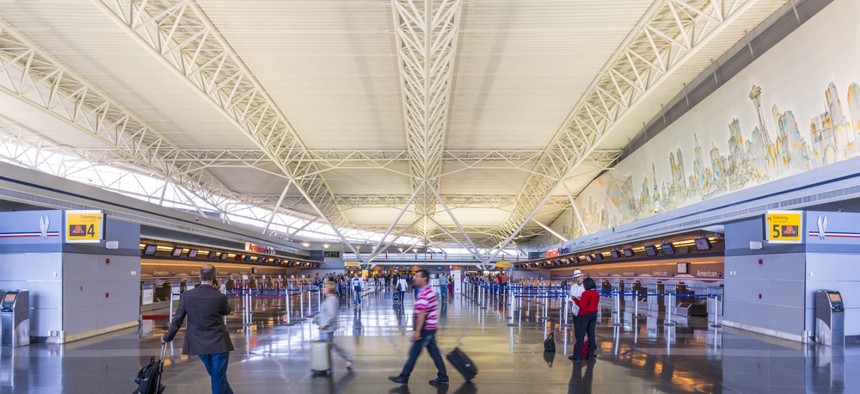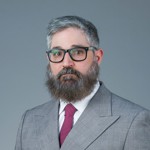
Air travelers walk through New York's John F. Kennedy International Airport in 2013. Sean Pavone / Shutterstock.com
The U.S. Plans to Amp Up Ebola Screening at Airports, But Will It Work?
Experts suggest screenings aren't iron-clad at preventing the disease from making its way to the United States.
With Ebola cases in the United States and Europe this month, the Centers for Disease Control is looking to scale up prevention and detection methods to ensure the virus does not make serious headway. According to The New York Times, the CDC is considering several methods to screen passengers who are flying from the affected nations in West Africa for the virus.
CDC Director Dr. Thomas Frieden told the newspaper that a more detailed health questionnaire of air travelers is an option, as is the screening of temperatures of passengers arriving into the United States from West Africa. Frieden did not provide more specific details of the implementation of these methods.
"We recognize that whatever we do, until the disease is controlled in Africa, we can’t get the risk to zero here," Frieden told The Times Tuesday. "We may be able to reduce it and we’ll look at every opportunity to do that."
Echoing statements made by U.S. Africa Command's Gen. David Rodriguez Tuesday, Frieden and other experts told the paper that containing the disease in West Africa is the best way to defeat it. Frieden said the CDC has developed far better screening protocols in the affected countries.
In the last two months, Dr. Frieden said, local officials have screened more than 36,000 passengers. Of those, Dr. Frieden said, about 77 registered a fever or other symptoms and were not allowed to travel. At this point, he said, none of them were known to have been infected by Ebola.
There are remaining questions about the efficacy of the proposed screening methods at airports for incoming passengers. Larry Gostin, a professor of global health law at Georgetown University, told National Public Radio Wednesday that there is no guarantee that the disease will stay in West Africa.
"Fever screening can be unobtrusive, but let's not have the false impression that this is a tried-and-true method and it's going to keep Ebola out of the United States," he told NPR. "It's just not the case."
According to the CDC, the symptoms of the virus may appear anywhere from 2 days to three weeks after exposure to Ebola. A person infected by the virus could not develop a fever until far after that person has flown back to the U.S.
Other experts agreed when talking to Defense One's Patrick Tucker in August. Dr. Noreen Hynes with the Johns Hopkins Bloomberg School of Public Health said that things like airport screening will not stop the disease without more work in West Africa to contain Ebola.
"Right now the trajectory is still in the upward mode," she said.
Sheldon H. Jacobson, a professor of computer science at the University of Illinois, told Tucker that airport screening would be helpful, but needs to be thorough to be worthwhile and to not bring back false positives.
"Prescreening would be prudent, and reasonable, based on the information available. Public health personnel would need to develop appropriate criteria that yield good results and also limit false positives. In essence, prescreening, if done appropriately, can work in any type of screening mechanism," he wrote to Defense One in an email.
Gostin suggested to NPR that the move is more likely a response to the public's demand for action than a response that is meant to be particularly effective. Citizens get upset -- especially after the first American Ebola patient died Wednesday in Texas -- and want the CDC to show it is working on containing the outbreak.
"Governments, even if they know better, will sometimes reply to that political outcry," Gostin said. "They're under a lot of pressure to do something [to] make the public feel reassured, even if it really doesn't make them safer."
"I think that thermal screeners help people feel safe," Hynes told Tucker in August.
(Image via Sean Pavone / Shutterstock.com)







